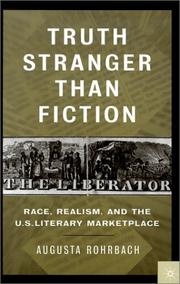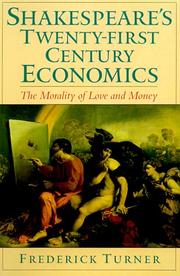| Listing 1 - 10 of 10 |
Sort by
|
Book
ISBN: 9782745325990 274532599X Year: 2014 Volume: 58 Publisher: Paris: Champion,
Abstract | Keywords | Export | Availability | Bookmark
 Loading...
Loading...Choose an application
- Reference Manager
- EndNote
- RefWorks (Direct export to RefWorks)
Fiction --- Old French literature --- French literature --- Economics in literature. --- Money in literature. --- Littérature française --- Economie politique dans la littérature --- Monnaie dans la littérature --- History and criticism. --- Histoire et critique --- Economics in literature --- Money in literature --- Merchants in literature --- History and criticism --- Littérature française --- Economie politique dans la littérature --- Monnaie dans la littérature --- French literature - To 1500 - History and criticism
Book
ISBN: 2600001026 9782600001021 Year: 1995 Volume: 295 Publisher: Genève: Droz,
Abstract | Keywords | Export | Availability | Bookmark
 Loading...
Loading...Choose an application
- Reference Manager
- EndNote
- RefWorks (Direct export to RefWorks)
Geld in de literatuur --- Magic in literature --- Magie dans la litterature --- Magie in de literatuur --- Metafoor --- Metaphor --- Money in literature --- Monnaie dans la litterature --- Métaphore --- Parabole --- Money in literature. --- Magic in literature. --- Witchcraft in literature. --- Witchcraft in literature --- Montaigne, Michel de --- De Montaigne, Michel --- Montaigne, Michel de, --- MONTAIGNE (MICHEL EYQUEM DE), ECRIVAIN FRANCAIS, 1533-1592 --- MONNAIE --- MAGIE --- ESSAIS
Book
ISBN: 9782823601602 9782823604023 2823601600 Year: 2013 Publisher: Paris: Éd. de l'Olivier,
Abstract | Keywords | Export | Availability | Bookmark
 Loading...
Loading...Choose an application
- Reference Manager
- EndNote
- RefWorks (Direct export to RefWorks)
Ce premier volume, consacré à l'étude du roman Le comte de Monte-Cristo d'A. Dumas, analyse les rapports entre le banquier Danglars et le comte. Il montre comment ce dernier, en brillant économiste et redoutable homme d'affaires, se venge et ruine son adversaire. L'auteur apporte un nouvel éclairage sur cette oeuvre et sur les rouages de la finance moderne.
Swindlers and swindling in literature --- Money in literature --- Escrocs et escroqueries dans la littérature --- Monnaie dans la littérature --- Dumas, Alexandre, --- Revenge in literature --- Escrocs et escroqueries dans la littérature --- Monnaie dans la littérature --- Dumas, Alexandre, - 1802-1870 - Comte de Monte-Cristo
Book
ISBN: 9780199372874 Year: 2015 Publisher: Oxford New York [etc.] Oxford University Press
Abstract | Keywords | Export | Availability | Bookmark
 Loading...
Loading...Choose an application
- Reference Manager
- EndNote
- RefWorks (Direct export to RefWorks)
Capitalism and literature --- Capitalisme et littérature --- Crises financières dans la littérature --- Finance in literature --- Finances dans la litterture --- Financial crises in literature --- Financie in literatuur --- Financiële crisissen in de literatuur --- Geld in de literatuur --- Kapitalisme en literatuur --- Money in literature --- Monnaie dans la litterature --- Wall Street (Film) --- Wall Street (Motion picture) --- American fiction --- 20th century --- History and criticism --- DeLillo, Don --- Wolfe, Tom --- Ellis, Bret Easton
Book
ISBN: 9782600006279 2600006273 Year: 2001 Volume: 61 5 Publisher: Genève: Droz,
Abstract | Keywords | Export | Availability | Bookmark
 Loading...
Loading...Choose an application
- Reference Manager
- EndNote
- RefWorks (Direct export to RefWorks)
Thematology --- French literature --- anno 1500-1599 --- Geld in de literatuur --- Literature and multilingualism --- Literatuur en veeltaligheid --- Littérature et multilinguisme --- Money in literature --- Monnaie dans la litterature --- Multilingualism and literature --- Multilinguisme et littérature --- Veeltaligheid en literatuur --- Money in literature. --- Multilingualism and literature. --- History and criticism. --- -Money in literature --- Literature --- History and criticism --- Rabelais, François --- Criticism and interpretation. --- Rabelais, Francois, --- Alcofribas, --- Alcofribas Nasier, --- Alcofrybas, --- Alcofrybas Nasier, --- Nasier, Alcofribas, --- Rabelais, Francis, --- Rabelais, François, --- Rabelais, Frants, --- Rabelais, Franz, --- Rable, Fransua, --- Rampelai, Phransoua, --- Рабле, Франсуа, --- ראבלע, פ. --- Рабле, Франсоа, --- Rable, Fransoa, --- Criticism and interpretation --- 16th century --- Rable, Pʻransua, --- French literature - 16th century - History and criticism. --- HISTOIRE CULTURELLE --- EUROPE --- 16E-18E SIECLES --- CONDITIONS ECONOMIQUES --- 16E-17E SIECLES

ISSN: 04352866; ISBN: 0729408493 9780729408493 Year: 2004 Volume: 2004:10 Publisher: Oxford: Voltaire foundation,
Abstract | Keywords | Export | Availability | Bookmark
 Loading...
Loading...Choose an application
- Reference Manager
- EndNote
- RefWorks (Direct export to RefWorks)
Economics in literature --- Economie dans la littérature --- Economie in de literatuur --- Geld in de literatuur --- Money in literature --- Monnaie dans la litterature --- Economics and literature --- Artists and patrons --- Economie politique et littérature --- Artistes et mécènes --- History --- Histoire --- France --- Intellectual life --- Vie intellectuelle --- French literature --- History and criticism --- Economie politique et littérature --- Artistes et mécènes --- 17th century --- 18th century --- French literature - 17th century - History and criticism --- French literature - 18th century - History and criticism --- Economics and literature - France - History - 17th century --- Economics and literature - France - History - 18th century

ISBN: 0312239211 Year: 2002 Publisher: New York Palgrave
Abstract | Keywords | Export | Availability | Bookmark
 Loading...
Loading...Choose an application
- Reference Manager
- EndNote
- RefWorks (Direct export to RefWorks)
American literature --- anno 1800-1899 --- African Americans in literature --- Afro-Americans in literature --- Afro-Amerikanen in de literatuur --- Afro-Américains dans la littérature --- Amerikaanse zwarten in de literatuur --- Black Americans in literature --- Esclavage dans la littérature --- Esclaves dans la littérature --- Geld in de literatuur --- Littérature réaliste --- Money in literature --- Monnaie dans la litterature --- Negroes in literature --- Neorealism (Literature) --- Neorealisme (Literatuur) --- Noirs américains dans la littérature --- Néoréalisme (Littérature) --- Race dans la littérature --- Race in literature --- Ras in de literatuur --- Realism (Literary movement) --- Realism in literature --- Realisme (Letterkundige beweging) --- Realisme (Literaire beweging) --- Realisme in de literatuur --- Realistische literatuur --- Réalisme (Mouvement littéraire) --- Réalisme dans la littérature --- Slaven in de literatuur --- Slavernij in de literatuur --- Slavery in literature --- Slaves in literature --- Zwarte Amerikanen in de literatuur --- American fiction --- 19th century --- History and criticism --- Antislavery movements --- United States --- History --- Capitalism and literature --- Economics and literature --- Howells, William Dean --- Wharton, Edith Newbold --- Criticism and interpretation --- Liberator, The

ISBN: 0521832284 0521539927 1107148774 0511185871 0511185049 0511313756 0511483082 1280449535 0511187718 0511186789 9780511186783 9780511187711 9780521539920 9780521832281 9780511185878 9780511185045 9780511483080 9781280449536 9786610449538 6610449538 9780511313752 9781107148772 Year: 2004 Publisher: Cambridge Cambridge University press
Abstract | Keywords | Export | Availability | Bookmark
 Loading...
Loading...Choose an application
- Reference Manager
- EndNote
- RefWorks (Direct export to RefWorks)
How were the Greeks of the sixth century BC able to invent philosophy and tragedy? In this book Richard Seaford argues that a large part of the answer can be found in another momentous development, the invention and rapid spread of coinage which produced the first ever thoroughly monetised society. By transforming social relations, monetisation contributed to the ideas of the universe as an impersonal system (presocratic philosophy) and of the individual alienated from his own kin and from the gods (in tragedy). Seaford argues that an important precondition for this monetisation was the Greek practice of animal sacrifice, as represented in Homeric Epic, which describes a premonetary world on the point of producing money. This book combines social history, economic anthropology, numismatics and the close reading of literary, inscriptional, and philosophical texts. Questioning the origins and shaping force of Greek philosophy, this is a major book with wide appeal.
Greek literature --- Money in literature. --- Greek drama (Tragedy) --- Epic poetry, Greek --- Economics and literature --- Economics in literature. --- Philosophy, Ancient. --- Money --- Littérature grecque --- Monnaie dans la littérature --- Tragédie grecque --- Poésie épique grecque --- Economie politique et littérature --- Economie politique dans la littérature --- Philosophie ancienne --- Monnaie --- History and criticism. --- Histoire et critique --- Homer --- Knowledge --- Economics. --- Greece --- Grèce --- Economic conditions --- Conditions économiques --- Littérature grecque --- Monnaie dans la littérature --- Tragédie grecque --- Poésie épique grecque --- Economie politique et littérature --- Economie politique dans la littérature --- Grèce --- Conditions économiques --- Arts and Humanities --- History --- Currency --- Monetary question --- Money, Primitive --- Specie --- Standard of value --- Exchange --- Finance --- Value --- Banks and banking --- Coinage --- Currency question --- Gold --- Silver --- Silver question --- Wealth --- Ancient philosophy --- Greek philosophy --- Philosophy, Greek --- Philosophy, Roman --- Roman philosophy --- Literature --- Literature and economics --- Economic aspects --- Hóiméar --- Hūmīrūs --- Homeros --- Gomer --- Omir --- Omer --- Omero --- Ho-ma --- Homa --- Homérosz --- האמער --- הומירוס --- הומר --- הומרוס --- هومر --- هوميروس --- 荷马 --- Ὅμηρος --- Гамэр --- Hamėr --- Омир --- Homère --- Homero --- 호메로스 --- Homerosŭ --- Homērs --- Homeras --- Хомер --- ホメーロス --- ホメロス --- Гомер --- Homeri --- Hema --- Pseudo-Homer --- Pseudo Omero --- Homerus --- GR / Greece - Griekenland - Grèce --- 331.151 --- 92 --- Geschiedenis. --- Histoire. --- History. --- 92 Geschiedenis. --- 92 Histoire. --- 92 History. --- Geldwezen in de oudheid --- Geschiedenis
Multi
ISBN: 9781107009271 1107009278 9780511920790 9781107470729 1107470722 1139209736 1107228212 1139222627 9786613580085 1139217828 1139224336 113921473X 0511920792 1280485108 113922090X 9781139224338 9781139220903 9781139217828 9781139217828 9781107228214 9781139209731 9781280485107 9781139222624 6613580082 Year: 2012 Publisher: Cambridge Cambridge University Press
Abstract | Keywords | Export | Availability | Bookmark
 Loading...
Loading...Choose an application
- Reference Manager
- EndNote
- RefWorks (Direct export to RefWorks)
This book further develops Professor Seaford's innovative work on the study of ritual and money in the developing Greek polis. It employs the concept of the chronotope, which refers to the phenomenon whereby the spatial and temporal frameworks explicit or implicit in a text have the same structure, and uncovers various such chronotopes in Homer, the Homeric Hymn to Demeter, Presocratic philosophy and in particular the tragedies of Aeschylus. Mikhail Bakhtin's pioneering use of the chronotope was in literary analysis. This study by contrast derives the variety of chronotopes manifest in Greek texts from the variety of socially integrative practices in the developing polis - notably reciprocity, collective ritual and monetised exchange. In particular, the Oresteia of Aeschylus embodies the reassuring absorption of the new and threatening monetised chronotope into the traditional chronotope that arises from collective ritual with its aetiological myth. This argument includes the first ever demonstration of the profound affinities between Aeschylus and the (Presocratic) philosophy of his time.
Cosmology in literature. --- Space and time in literature. --- Social interaction in literature. --- Money in literature. --- Ritual in literature. --- Greek drama (Tragedy) --- Philosophy, Ancient. --- Cosmologie dans la littérature --- Espace et temps dans la littérature --- Interaction sociale dans la littérature --- Monnaie dans la littérature --- Rituel dans la littérature --- Tragédie grecque --- Philosophie ancienne --- History and criticism. --- Histoire et critique --- Aeschylus --- Criticism and interpretation. --- Thematology --- Drama --- Cosmologie dans la littérature --- Espace et temps dans la littérature --- Interaction sociale dans la littérature --- Monnaie dans la littérature --- Rituel dans la littérature --- Tragédie grecque --- Cosmology in literature --- Money in literature --- Philosophy, Ancient --- Ritual in literature --- Social interaction in literature --- Space and time in literature --- Space and time as a theme in literature --- Ancient philosophy --- Greek philosophy --- Philosophy, Greek --- Philosophy, Roman --- Roman philosophy --- History and criticism --- Aischylos --- Eschilo --- Eschyle --- Eschylus --- Arts and Humanities --- History --- Eskhil --- Esquilo --- Aiskhilos --- Eshil --- Æskílos --- Ajschylos --- Eschil --- Esḳilos --- Äschylos --- Eskili --- Aiszkhülosz --- Eschylos --- Iskilos --- Эсхил --- אייסכילוס --- איסכילאס --- איסכילוס --- إيسخولوس --- ايسخيلوس --- Αἰσχύλος

ISBN: 0195128613 0195351738 1280530480 1429404752 9781429404754 9781280530487 9780195351736 9780195128611 0197726097 Year: 1999 Publisher: New York Oxford Oxford University Press
Abstract | Keywords | Export | Availability | Bookmark
 Loading...
Loading...Choose an application
- Reference Manager
- EndNote
- RefWorks (Direct export to RefWorks)
Making constant recourse to well-known material from Shakespeare's plays, this text demonstrates that terms of money and value permeate our minds and lives even in our most mundane moments.
Economics in literature --- Economie dans la littérature --- Economie in de literatuur --- Ethics in literature --- Ethiek in de literatuur --- Ethique dans la littérature --- Geld in de literatuur --- Money in literature --- Monnaie dans la litterature --- Didactic drama, English. --- Economics. --- Economics and literature. --- Economics and literature - England - History - 16th century. --- Economics in literature. --- Ethics in literature. --- History. --- History and criticism. --- Money in literature. --- Moral and ethical aspects. --- Shakespeare, William. --- Economics and literature --- Didactic drama, English --- Economics --- English --- Languages & Literatures --- English Literature --- History --- History and criticism --- Moral and ethical aspects --- Shakespeare, William, --- Knowledge --- Ethics. --- Economic theory --- Political economy --- Literature --- Literature and economics --- Economic aspects --- Šekspir, Vil'jam --- Social sciences --- Economic man --- Shakespeare, William --- Ethics --- England --- 16th century --- 17th century --- Didactic drama [English ] --- Shakespear, William, --- Shakspeare, William, --- Šekʻspiri, Uiliam, --- Saixpēr, Gouilliam, --- Shakspere, William, --- Shikisbīr, Wilyam, --- Szekspir, Wiliam, --- Šekspyras, --- Shekspir, Vilʹi︠a︡m, --- Šekspir, Viljem, --- Tsikinya-chaka, --- Sha-shih-pi-ya, --- Shashibiya, --- Sheḳspir, Ṿilyam, --- Shaḳspir, Ṿilyam, --- Syeiksŭpʻio, --- Shekspir, V. --- Szekspir, William, --- Shakespeare, Guglielmo, --- Shake-speare, William, --- Sha-ō, --- Şekspir, --- Shekspir, Uiliam, --- Shekspir, U. --- Šekspir, Vilijam, --- Ṣēkspiyar, Viliyam, --- Shakspir, --- Shekspyr, Vyli︠e︡m, --- Şekspir, Velyam, --- Ṣēkspiyar, Villiyam, --- Shēkʻspʻiyr, Vlilliam, --- Ṣēkspiyar, --- Ṣēkspiyar Mahākavi, --- Ṣēkspiyar Mahākaviya, --- Sheḳspier, Ṿilyam, --- Shēkʻspir, --- Shakespeare, --- Śeksper, --- Шекспир, Вильям, --- Шекспир, Уильям, --- שייקספיר, וויליאם, --- שייקספיר, וו., --- שיקספיר, וויליאם --- שיקספיר, ויליאם --- שיקספיר, ויליאם, --- שכספיר, ויליאם, --- שכספיר, וילים, --- שכספיר, ו׳ --- שעפקספיר, וויליאם, --- שעקספיער, וויליאם --- שעקספיער, וויליאם, --- שעקספיער, ווילליאם --- שעקספיער, וו., --- שעקספיר --- שעקספיר, וו --- שעקספיר, וויליאם, --- שעקספיר, וויליאמ --- שעקספיר, ווילליאם --- שעקספיר, ווילליאם, --- שעקספיר, וו., --- שעקספיר, װיליאם, --- שעקספיר, װילליאם, --- שעקספיר, װ., --- שעקספער --- שעקספער, וויליאמ --- שקספיר --- שקספיר, וו --- שקספיר, וויליאם --- שקספיר, וויליאם, --- שקספיר, ווילים, --- שקספיר, וילאם --- שקספיר, ויליאם --- שקספיר, ויליאם, --- שקספיר, ויליים, --- שקספיר, וילים --- שקספיר, וילים, --- شاكسبير، وليم --- شاكسپير، وليم --- شكسبير، وليام --- شكسبير، وليم --- شكسبير، وليم، --- شكسبير، و. --- شكسپير، وليم --- شكسپير، ويليام --- شيكسبير، وليام --- شيكسبير، وليام.، --- شيكسبير، وليم --- شکسبير، وليم --- وليم شکسبير --- 沙士北亞威廉姆, --- 沙士比亞威廉姆, --- 莎士比亞威廉姆, --- 莎士比亞威廉, --- 莎士比亞, --- Knowledge and learning.
| Listing 1 - 10 of 10 |
Sort by
|

 Search
Search Feedback
Feedback About UniCat
About UniCat  Help
Help News
News